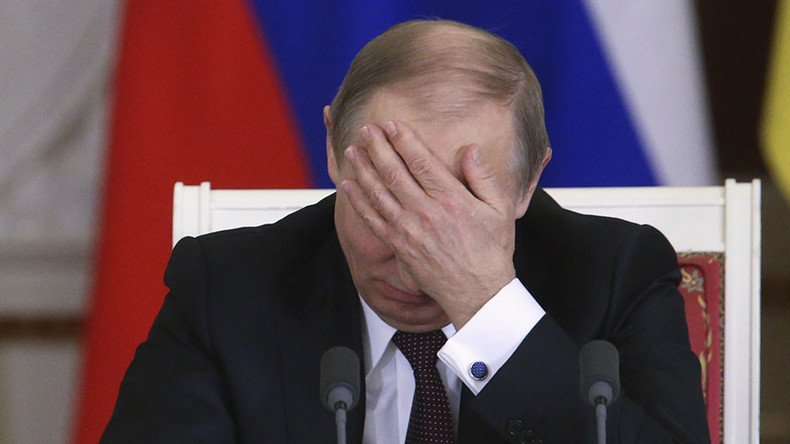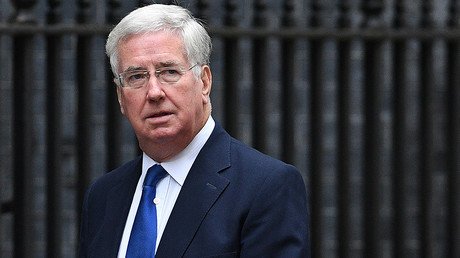Hackneyed specter of bogeyman Putin becomes election weapon for Tories

Theresa May’s Conservative Party has launched its general election bid with a fresh scaremongering campaign, arguing that unless Tories prevail, Vladimir Putin will win.
Russian President Vladimir Putin has already become a prominent figure in Britain’s upcoming general election, having been dragged into the pre-election debate by the Tories.
Facing widespread public criticism for not having a clear Brexit strategy and constantly implementing austerity measures, the Conservative Party has resorted to the now globally-tested method of using Vladimir Putin as a bogeyman to win more votes.
Earlier this week, British Defense Secretary Michael Fallon said Russia’s president would welcome a Labour Party victory.
Speaking at an event to mark the deployment of 800 British troops in Estonia as part of a NATO mission in the region, Fallon claimed that a “feeble and gutless” Corbyn plays into the hands of Moscow.
“Russia will be watching Labour’s feebleness that Jeremy Corbyn has not supported this deployment. He has questioned it. He has questioned this deployment.
“Russia will be watching that, will have noted that feebleness and will be watching it throughout this campaign,” the Defence Secretary said.
This rhetoric echoes an accusation made by Tory Armed Forces Minister Mike Penning, who claimed that Corbyn was in some way collaborating with the Russian government.
“The Labour leader would rather collaborate with Russian aggression than mutually support Britain’s NATO allies,” Penning said, referring to Labour’s concerns that further NATO deployment on Russia’s borders could escalate tensions.
In addition to accusing the main opposition leader of being in bed with the Kremlin, the Tories also warn that Vladimir Putin could try to hack the British elections in order to prevent the Conservative Party from winning.
For instance, Fallon made the unsubstantiated suggestion that Russian intelligence services will try to influence the upcoming elections through hacking, while at the same time assuring that the British security agencies are fully prepared for any cyberattacks.
“We took steps before the 2015 election to protect our systems against Russian interference, including our democratic systems.
Who does Vladimir Putin want in this election?
— John Rentoul (@JohnRentoul) 18 April 2017
“Those protections remain in place and we will obviously be watching for any of the kind of interference we have seen in continental elections and is alleged to have taken place in the American election but we are well protected,” Fallon said.
GCHQ, Britain’s cyber-intelligence agency, which is subordinate to Tory Foreign Minister Boris Johnson, made a show of going on high alert less than 24 hours after Theresa May announced the upcoming general election to fend off Russian cyberattacks.
“It is understood that GCHQ and the National Cyber Security Centre will be working with the Cabinet Office to deliver a safe election so the same thing does not happen here as happened in America,” a Whitehall source told the Times, referring to allegations that Russia had hacked the 2016 US elections to aid Donald Trump.
However, the report by the US intelligence community said that, even if the alleged Russian involvement had taken place, it could not make judgment as to whether it had affected the outcome of the American presidential elections.
Western establishment parties have consistently accused Russia of rigging elections in favor of its opponents, but the Russian government has staunchly denied these claims as “baseless and amateurish.”
Unsuccessful Democratic presidential candidate Hillary Clinton claimed that Vladimir Putin has a personal “personal beef” against her, and thus ordered a cyber-attack on her election campaign.
Richard Ferrand, the campaign manager for Emmanuel Macron, a liberal candidate in France’s presidential election, has also argued that Putin is hacking his boss’s campaign.
“These attacks are coming from the Russian border,” Ferrand said.
“We want a strong Europe. That’s why we’re subject to attacks on our information system from the Russian state,” he said.
It’s already clear that the British general elections will not be exempt from the same anti-Russian scaremongering rhetoric, which critics say is an attempt to divert attention from the real issues.












